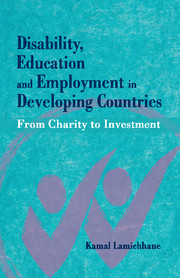Book contents
- Frontmatter
- Contents
- List of Tables and Figures
- Preface
- Acknowledgements
- 1 Fundamentals of Disability Studies
- 2 Disability and the Global Employment Situation
- 3 Disability and the Role of Education in Jobs: Case Studies from Nepal and the Philippines
- 4 Disability and Jobs in a Post-Conflict Country: Cambodia
- 5 Gender and Jobs: A Comparison between People with and without Disabilities in Bangladesh
- 6 Disability and Human Capital Investment
- 7 Disability, Poverty and Inequality: A Case Study in Nepal
- 8 Disability and Job Satisfaction Differentials
- 9 Disability and Determinants of Education: A Case from India
- 10 Disability and Barriers to Education
- 11 The Way Forward: Investment in Disability
- Index
- About the Author
11 - The Way Forward: Investment in Disability
Published online by Cambridge University Press: 05 February 2015
- Frontmatter
- Contents
- List of Tables and Figures
- Preface
- Acknowledgements
- 1 Fundamentals of Disability Studies
- 2 Disability and the Global Employment Situation
- 3 Disability and the Role of Education in Jobs: Case Studies from Nepal and the Philippines
- 4 Disability and Jobs in a Post-Conflict Country: Cambodia
- 5 Gender and Jobs: A Comparison between People with and without Disabilities in Bangladesh
- 6 Disability and Human Capital Investment
- 7 Disability, Poverty and Inequality: A Case Study in Nepal
- 8 Disability and Job Satisfaction Differentials
- 9 Disability and Determinants of Education: A Case from India
- 10 Disability and Barriers to Education
- 11 The Way Forward: Investment in Disability
- Index
- About the Author
Summary
Introduction
This chapter provides a summary of the main analysis and conclusions drawn from the empirical studies in this book. In addition, I draw policy lessons from the empirical and comparative analysis. Policy interventions in developing countries are necessary to bring about real changes in the livelihoods of people with disabilities and their families to bring them into the framework of inclusive development. One of the strategies for national and international agencies and governments should be non-discriminatory investment in the education of people with disabilities, with the aim of increasing employability, generating income and mitigating poverty.
Bringing disability issues into the framework of inclusive development would help achieve inclusiveness and sustainability in development. In addition, I offer an agenda for research to inform and guide future directions in disability studies. This chapter emphasizes the importance of human capital for people with disabilities to highlight the importance of education and investment in this area. It also ties together the strategies and approaches proposed in this book, considering disability from an investment approach so that people with disabilities can establish their position in society as contributing members, instead of simply being regarded as recipients of assistance.
Policy recommendations
The individual country analyses presented in the previous chapters have provided empirical evidence about the importance of investing in the education of people with disabilities who have historically been excluded and discriminated against. I have presented extensive discussions on the positive effect of education, with an emphasis on investment in education to potentially maximize the labour market participation of people with disabilities.
The first chapter provided some perspectives on disability focusing on current understandings of disability and calling for a change in paradigm from charity to an investment approach. The ongoing discussions in disability studies can be broadly categorized into two major models – social versus medical. The medical model of disability underpins much of the segregation experienced by presenting disability as an individual medical condition that needs to be separated from society and diagnosed. The social model was instrumental in shifting the focus of disability issues from the individual to society, and to considering disability as a human right issue.
- Type
- Chapter
- Information
- Disability, Education and Employment in Developing CountriesFrom Charity to Investment, pp. 246 - 262Publisher: Cambridge University PressPrint publication year: 2015



